
When you are budgeting for a new home, it’s easy to focus on the down payment, but do not forget the closing costs. These fees typically range from 2% to 5% of the home’s purchase price and cover things like the appraisal, title search, loan origination, and other administrative expenses. For many buyers, especially first-timers, they can feel like an unwelcome surprise.
The good news? There are creative, effective ways to reduce these expenses and make homeownership more affordable.
1. Negotiate With the Seller
In a buyer-friendly market, you may be able to negotiate for the seller to cover part (or all) of your closing costs. This is called a seller concession, and it can be a powerful tool when structured correctly in your purchase agreement. Keep in mind that there are limits based on loan type and how much you’re putting down, so it’s important to strategize with your mortgage professional and real estate agent.
2. Ask About Lender Credits
Some lenders offer credits that can reduce your upfront closing costs in exchange for a slightly higher interest rate. While this might mean paying more overtime, it can be a smart move if you’re short on cash now and plan to refinance or sell within a few years.
3. Shop Around for Services
Not all closing costs are set in stone. Fees like title insurance, pest inspection, or the survey can vary depending on the provider. Ask your lender for a Loan Estimate early in the process and compare quotes from multiple providers for the services you’re allowed to shop for. A few calls can save you hundreds.
4. Use a First-Time Buyer Program or Grant
There are local, state, and even national programs that offer down payment and closing cost assistance to qualified buyers. Many of these are aimed at first-time buyers, veterans, or low-to-moderate income households. These programs may offer grants or forgivable loans to help reduce out-of-pocket costs.
5. Roll Costs Into the Loan (If Eligible)
For some loan types, like VA or USDA loans, you may be able to roll certain closing costs into your loan balance. While this increases your total loan amount, it can ease the upfront burden when cash is tight.
6. Plan Your Timing Carefully
The day you close can impact certain prorated costs like property taxes or prepaid interest. Closing at the end of the month, for example, can lower the amount of prepaid interest you owe at closing. Small timing tweaks can add up to big savings.
Closing costs do not have to catch you off guard or break your budget. With a little planning, negotiation, and the right guidance, you can minimize what you pay without sacrificing the quality of your loan or service.
Give me a call to discuss your goals and explore which strategies might work best for your situation!
 When exploring home financing options, many borrowers are intrigued by interest-only mortgages. These loans offer the benefit of lower initial monthly payments, which can seem attractive, especially in high-cost areas or when cash flow is tight. But how exactly do they work, and are they the right fit for your financial goals?
When exploring home financing options, many borrowers are intrigued by interest-only mortgages. These loans offer the benefit of lower initial monthly payments, which can seem attractive, especially in high-cost areas or when cash flow is tight. But how exactly do they work, and are they the right fit for your financial goals?